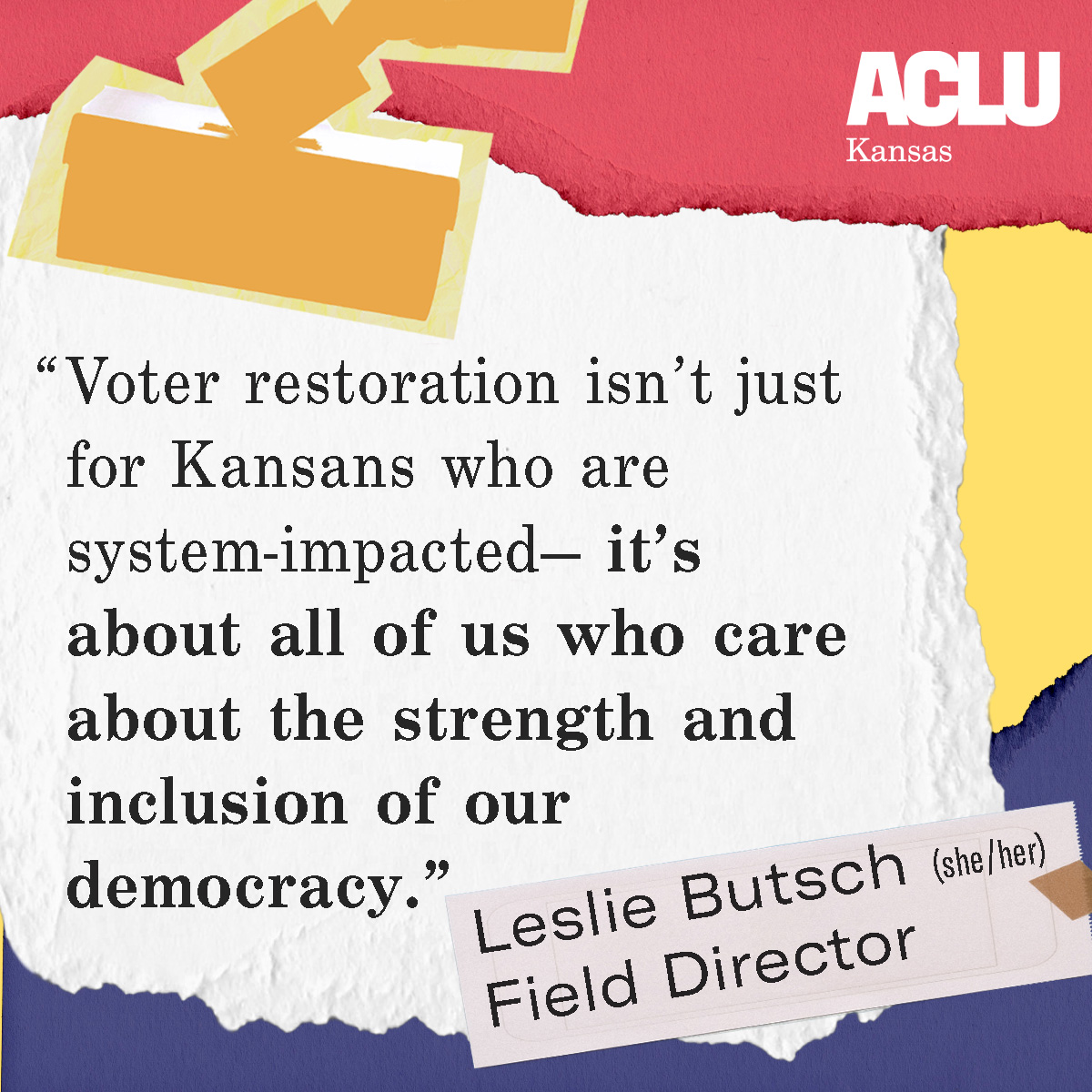In 2019, Wyandotte County’s DA, Mark Dupree, asked the Vera Institute of Justice to help the DA’s office address racial inequities in the county’s criminal legal system with a focus on prosecution reform. Vera reports that Dupree was committed to transparency and racial equity “even if the data shows that my office has contributed to the issue.”
Vera used a variety of techniques to evaluate data generated by Wyandotte’s criminal legal system and to document the perspectives of community members who have had contact with the system.
Vera’s reporting highlights clear racial and economic disparities for people entering and passing through Wyandotte’s criminal legal system. Based on their findings, Vera made five recommendations to DA Dupree’s office.
1. Decline cases based on non-public safety stops.
These pretextual stops occur when a person is pulled over for a minor infraction (such as a broken taillight) while law enforcement seeks evidence of a more serious crime. Research on traffic stops in the US consistently demonstrates that Black and Latinx drivers are more likely to be stopped and searched despite not being more likely to carry contraband. Such racial profiling creates a clear bias in who enters the criminal justice system. The DA does not directly control policing; nonetheless, they can combat racial profiling by refusing to prosecute cases that result from these biased practices.
2. Lower and limit the use of bail.
A person who is unable to pay bail faces extended time in jail and risks losing their jobs and homes. Moreover, pretrial detention can hamper their ability to work freely with a lawyer to prepare their defense. These pressures can influence defendants to plead guilty to prevent even worse outcomes. Vera found that over 70% of Wyandotte respondents who took a plea deal did so to avoid more jail time.
Vera also found that existing bail practices disproportionately affected low-income neighborhoods. In Wyandotte, these neighborhoods are disproportionately made up of Black and Latinx families. The bail amounts faced by these neighborhoods are excessive considering annual incomes for these households are under $34,818: 59% of bonds were higher than $11,000 and 21% were higher than $34,818.
A person’s freedom should not be determined by their ability to pay. Pretrial detention should be reserved only for defendants who pose a risk to public safety or a flight risk. The DA can directly influence bail practices by requesting that bail be lowered or eliminated for low-level charges and non-violent crimes. Moreover, the DA can request judges to consider a defendant’s ability to pay when setting bail.
3. Exercise restraint in charging.
Participants in Vera’s research suggested that the legal system could better serve their communities if prosecutors had more restraint in charging. Specifically, they felt prosecutors should consider the type of crime, the age of the person charged, and the potential harms of charging a case -- especially when the defendant belongs to a marginalized group.
Prosecutors have absolute discretion over charging. Vera recommends Mark Dupree’s office adopt clear standards for charging that ensure fairness and equity while promoting safe, healthy, and strong communities.
4. Expand diversion programs.
One way prosecutors can exercise restraint is by expanding diversion programs. Diversion programs attempt to minimize people’s contact with the criminal legal system by targeting the underlying problems that lead to criminalized behavior in the first place. These offer an alternative to incarceration by addressing the root causes of community instability such as food and housing insecurity, joblessness, lack of educational resources, and unmet mental health needs.
The Wyandotte DA could expand diversion by using it as the standard response to certain offenses (e.g., in non-violent drug cases) and by developing stronger partnerships with responsive community-based services to address unmet needs. Vera specifically recommends Wyandotte’s DA office develop a juvenile diversion program as a juvenile’s involvement in the criminal legal system has been demonstrated to increase the likelihood of offending and arrest.
5. Increase transparency.
Finally, Vera found that many community members said they became involved in the criminal justice system because they did not know their rights or how the legal system works. Moreover, community members expressed a lack of trust in the system and its protection of people’s rights.
Vera recommends the DA’s office make better efforts to communicate its programs and policies to the community and, specifically, to hire a community liaison officer to manage ongoing communication between the DA’s office and the community. Finally, Vera recommends the DA’s office promote transparency and accountability by publishing office data on a public dashboard.
—
Prosecutors should be responsive and accountable to the communities they serve. A criminal justice system that punishes poverty, mental illness and substance use does not serve Wyandotte County. A system that disproportionately imprisons Black and Latinx people is unjust.
You can join the work with the ACLU of Kansas to reimagine a criminal legal system that respects the rights of all; where freedom doesn’t depend on wealth, fewer people are incarcerated, and taxes are wisely invested in evidence-based solutions.
You can read Vera's report here.
Date
Monday, November 27, 2023 - 5:30pm
Featured image
Show featured image
Hide banner image
Related issues
Criminal Legal Reform
Show related content
Tweet Text
[node:title]
Type
Menu parent dynamic listing
Show PDF in viewer on page
Style
Standard with sidebar
Show list numbers
Author
Cameron Evans
Here at ACLU of Kansas, we’re embarking on a new project: to inform Kansans re-entering from incarceration of their voting rights.
In Kansas, if you’re convicted of a felony, you lose your voting rights while serving your sentence - this is called felony disenfranchisement. Your rights are only restored and you can register to vote after your sentence has been completed. This means that Kansas has a partial disenfranchisement system, in contrast to other states that have complete felony disenfranchisement, meaning that they permanently ban people with felonies from voting ever again.
Unfortunately, because of the varied policies across the country, many Kansans with past felony convictions may not realize their voting rights can ever be restored, even if the solution could be as simple as a brochure included in paperwork from the parole office. Informing people of their rights is an obligation for not only people who work in the criminal legal system, but also for all of us who are in community with or who are returning citizens ourselves.
This work isn’t just for Kansans who are system-impacted – it’s about all of us who care about the strength and inclusion of our democracy.
Felony disenfranchisement, and the lack of education about voting rights restoration after incarceration, is just one thread in a web of tactics that make it harder to vote. In Kansas, most people think politicians should be making it easier, not more difficult, to participate in our democracy. Yet in the 2023 state legislative session, lawmakers attempted to pass a number of laws that would make it harder to vote, including a bill that would have done away with the 3-day window to cast a mail-in ballot. In Wyandotte, Sedgwick, and Johnson County, voters who are more comfortable in languages other than English don’t have access to voting materials in additional languages. In Ellis County, despite the community and student advocates organizing for it for years, there’s no polling location on campus at Fort Hays State University, and in Shawnee County, we’re asking election officials to expand early voting locations – right now, Shawnee County only has one.
In all of these seemingly different issue areas, there’s one clear throughline – these barriers make it harder to vote for specific groups of people: people of color, young people, people with disabilities, and poor and working class people. This is not a coincidence.
In Kansas and across the country, laws were created to deny people with felonies of their voting rights after the Reconstruction era, as a backlash to a growing political voice: Black voters. By disenfranchising people who had been convicted of a crime, lawmakers could make it harder to vote for the people most impacted by the criminal legal system: people of color.
We see this legacy today in the felony disenfranchisement laws that remain, and the gap in voting rights restoration education – if people don’t know they have voting rights, how can they participate in our democracy? And if someone’s punishment is prolonged by constantly extended their probation or parole for noncriminal violations, is that also a way to prevent them from voting?
All voter suppression tactics – whether it’s closing a 3-day window for mailing back your ballot, ignoring the wishes of young voters for a campus polling location, failing to provide materials in Spanish and other languages, or denying the right to vote to people with felonies – have always been about silencing some voices in order for others to maintain power and shirk accountability.
Our access to the ballot box is crucial to ensure that those who have decision-making power over policies directly impacting our families and communities should have to hear from us – and that means all of us.
Date
Wednesday, November 15, 2023 - 12:15pm
Featured image
Show featured image
Hide banner image
Related issues
Voting Rights
Show related content
Pinned related content
RESTORE MY VOTE: Voting after a felony in Kansas
Tweet Text
[node:title]
Type
Menu parent dynamic listing
Show PDF in viewer on page
Style
Standard with sidebar
Show list numbers
Author
Leslie B.
Why do trans people transition? It’s a confusion that lurks behind much of the anti-trans sentiment developing in Kansas and throughout the country.
The most common answer is that trans people transition to escape gender dysphoria: that every trans person experiences a deep and unabiding longing to be the “opposite gender,” a longing that manifests as a discomfort with and need to escape from the physical reality of our own bodies, and so we undergo transition to sever ourselves from the gender we reject and reattach ourselves to the expectations and social role of the gender we prefer. A simple exchange, switching out one gender for another and then continuing onward with our lives as if nothing had happened at all.
I can’t deny that this narrative has some truth—I have experienced gender dysphoria, and longed desperately to escape it. I have, late at night when no one else is awake and I’m alone with my thoughts, wished I could simply live the life of a woman without having to transition at all. Gender dysphoria can be cruel and lonely, and anyone who encounters it will want to leave it behind.
Maybe these things are why I transitioned. But to reduce transition to merely a panicked escape to greener pastures, an abandoning of one kind of gender expression for an equal but opposite one, does a disservice to the opportunities that transition provides us.
I began my transition with a specific image in my mind. Years of social conditioning had taught me what a woman was—and all the myriad ways in which I fell short of that standard. I would learn about women’s fashion and makeup, I thought, and undertake medical interventions to reshape my body. I would leave behind any trace of masculinity and take up womanhood in its place.
But as time went on, my understanding of what I needed to be changed, and so did my priorities. I went through with some elements of medical transition, taking hormones, but realized that many of my goals were misplaced. Parts of myself with which I felt uncomfortable—like my height or my long, straight nose—became less signifiers of my failure as a woman and more just part of who I was. As I learned more about myself, my understanding of the world and my place in it evolved. I became a more caring person, more ready to recognize complexity and uncertainty than I had before. Despite the cruelty that the outside world sometimes directs at people like me, transition strengthened my connections to that world, not diminished them.
If, as I discovered, I could contain so many contradicting desires within myself, then surely others must as well. And if I could embrace those contradictions—embrace change and reinvention—rather than reject them, then what wouldn’t be possible? What new ways of being might we be able to discover, together, if we saw ourselves less as static points in a world of change, but as beings who are constantly changing and rewriting ourselves?
I have never felt anything as sure as the peace that comes with knowing that I am who I decided to be.
Transition cannot be a linear process. We may set out on the journey with a simple goal in mind, but we inevitably find ourselves distracted on the way—what begins as a stroll down the road is interrupted by explorations of newly-discovered paths branching out in new directions. We may return to the main path, or we may not. Ahead of us, all around us, are infinite possibilities.
Every one of us, trans or cisgender, will navigate transition during our lives. Who can say that they are the same person as they were a decade ago? How about five years ago, or one? Any story of growing up, of getting older, is a transition narrative about refashioning oneself in a new stage of life. These transitions are complex and individuated: no two journeys the same, no experiences identical. To embrace transition means believing not only that people can change, but also that change itself defines our existence—that the line between what we are and what we become is thinner than we could have imagined.
To return to the question with which I began this piece: why do we transition? I’m not sure that I know. A question like that is far too personal, its answer too unique to each individual, for me to give a single, sweeping response. What I can say is this: no matter why we decide to start a transition (and I have discussed gender transition, but this concept could apply to other transitions as well: changing careers, moving to a new country, starting a family—all of these and more are also opportunities for discovery), the value of transition lies far outside the bounds of that single moment.
Transition is important not because of how it ends, but for what we must do to get to that end. It demands that we re-evaluate that which we had considered impossible, braving the unexplored possibilities before us, and commit to finding new ways of living. We, in transition, at once discover and create our own liberation.
Date
Tuesday, November 7, 2023 - 4:15pm
Featured image
Show featured image
Hide banner image
Related issues
LGBTQ+ Rights
Show related content
Tweet Text
[node:title]
Type
Menu parent dynamic listing
Show PDF in viewer on page
Style
Standard with sidebar
Show list numbers
Author
Jenna Bellemere
Pages


